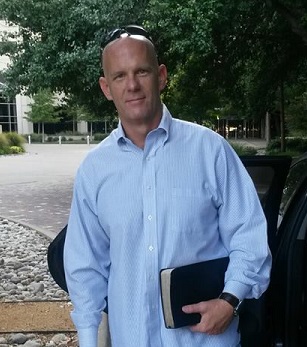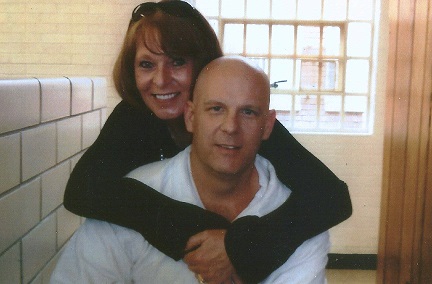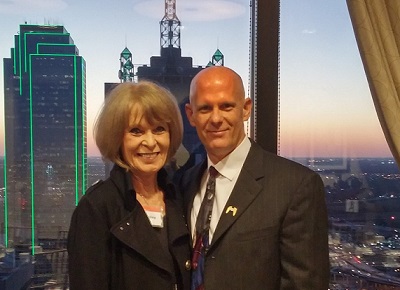The three months between the murder and his apprehension were a living hell.
"I tried to stay drunk or high to numb out my feelings of worthlessness," admits Bryan Kelley.
He contemplated suicide, but the law caught up with him before he gave in. Sitting in prison after landing a life sentence, Bryan felt like his life was over.
At the same time, he knew the life he had been living wasn't really a life at all.
ADDICT
 The years and months that led up to the busted drug deal had been one series of poor choices after another. Raised by a hard working teen mom (Dad walked out of the picture before he took his first steps), Bryan grew up in a community largely made up of "working class alcoholics" in small town Kansas. Although he began drinking in junior high, he somehow made it through high school on athletics and headed to college at Pittsburg State University in Kansas on a Division II track scholarship. He only made it one semester before he dropped out.
The years and months that led up to the busted drug deal had been one series of poor choices after another. Raised by a hard working teen mom (Dad walked out of the picture before he took his first steps), Bryan grew up in a community largely made up of "working class alcoholics" in small town Kansas. Although he began drinking in junior high, he somehow made it through high school on athletics and headed to college at Pittsburg State University in Kansas on a Division II track scholarship. He only made it one semester before he dropped out.
From there, Bryan moved to Texas went to work in construction, using up his paycheck on evening entertainment. "I was living to party, partying to live," he says.
Then he met a girl. He introduced her to cocaine, and the two settled into a dysfunctional relationship, based mostly on their shared addiction. During this time, Bryan lost his job, then his car. So when his girlfriend asked him to help her obtain a [large amount] of drugs, he couldn't say no. After all, she was all he really had left.
After picking up the package, Bryan's desires got the better of him and he ended up using all of the drugs himself on the way back. Knowing he couldn't return home without the cocaine, Bryan desperately tried to correct his mistake. He set up another rendezvous with the dealer, this time with a knife in his pocket.
"The meeting went horribly wrong," he recounts. Bryan ended up killing the man.
A SORRY DEAL
Sitting in prison staring at a life sentence at the age of 26, "everything I knew was over," Bryan said.
And everything he hadn't experienced yet was about to unfold.
A fellow prisoner invited him to attend a weekend-long event sponsored by the prison ministry Kairos. During the three days, he was fed home-cooked meals and experienced a bit of Christian warmth.
"They didn't try to cram the Bible down our throats. They just loved on us."
At one point in the weekend, he began to feel an urge to confess his crime—something he hadn't yet done, even in court. Through full tears, he unloaded to a caring volunteer who told him that the person he really needed to confess to was God.
"I can't do that," Bryan told the man. "I don't really deserve it."
"I didn't realize I would meet someone who is smarter than God," the volunteer responded. "You're not going to have any peace until you hand this over to Him."
"So I handed the broken pieces to God," Bryan says. "I told Him, 'I'm sorry for the deal I'm giving You.'"
STALWART
From there, Bryan began living—really living.
He went to addiction recovery classes. He earned a bachelor's degree in psychology. He became a college tutor and a peer educator. He got involved with a business program for prisoners called Prison Entrepreneurship Program (PEP). And he grew in his faith.
Over the next 20 years, God began to transform a confused and shattered young man into a rock for others.
In 2012, Bryan was transferred to the Torres Unit outside of San Antonio. There, he enrolled in a faith-based dorm run by Prison Fellowship. For the first time in his life, he had the opportunity to live with a group of other believers.
"I’d never been on a dorm where there were so many people collectively working on their spiritual walk. What a great atmosphere there was! I knew that everybody there was striving toward a better walk with Christ."
While there, he made a point of mentoring and discipling younger (or spiritually younger) prisoners in the path of Jesus. In many ways, Bryan saw his time at Torres as a chance to give back what he'd received over the years from older, wiser prisoners and godly volunteers.
Bryan always stood out to Prison Fellowship field director Willie Culpepper, who said, "What impressed me the most about Brian [was] his growth in getting to know God, his interest in wanting to adapt back into society, his attitude about becoming whole again, and moving on with his life."
Around this time, Bryan was up for parole (to serve the rest of his life sentence on probation). Strangely, he convinced the parole board to let him serve one more year in prison, so he could finish the program he had started with PEP.
And then on July 1, 2014, at the age of 48, Bryan finally walked out of prison.
MASTERPIECE
Despite the fact that he was immediately hired by PEP to serve as a transitional coordinator for other guys coming out of prison and that he had a halfway house where he could rest his head, reentry wasn't exactly a walk in the park.
"I had never sent an email, never Googled anything, never used a cell phone, never owned a debit card," he admits. "A lot of things were brand new."
Meanwhile, he was also promoted to executive relations manager at PEP, a role that has enabled him to purchase a car and begin saving for a house. But despite this, he struggled with discouragement when he learned that an application he had submitted to pursue his master's was rejected because of his record.
Still, he has hope, and relationships to invest in. First, to his mother Barb, who "stuck by me the whole time I was in prison," writing him letters almost daily for 22 years. As a gift to her and in celebration of his 50th birthday, Bryan recently treated her to a Caribbean cruise.
Even more recently, Bryan discovered his father—whom he had never met—via Facebook and sent him a greeting on Father's Day. "He sent me a message back that he was blown away and speechless and wanted to connect back." Since then, the two have chatted on the phone several times, and Bryan learned that his father—who told him his life was also a mess for a while, although never going to prison—had accepted Christ 15 years prior.
"We have bonded in our faith," Bryan says. He is making plans to visit his father in person at the end of the year.
Looking back over the past half century, Bryan only sees grace.
"My whole life since I've been out has been the Lord restoring what the locusts have eaten. It's amazing how he’s restored those broken pieces … He has taken my broken pieces and made it into a masterpiece."
SUPPORT THE WORK OF PRISON FELLOWSHIP
At Prison Fellowship we 'remember those in prison.' We believe in second chances, and that prison should be a place of rehabilitation. Through our programs, we offer incarcerated men and women hope, encouragement, and support, so that people like Bryan can be transformed.
LEARN MORE
